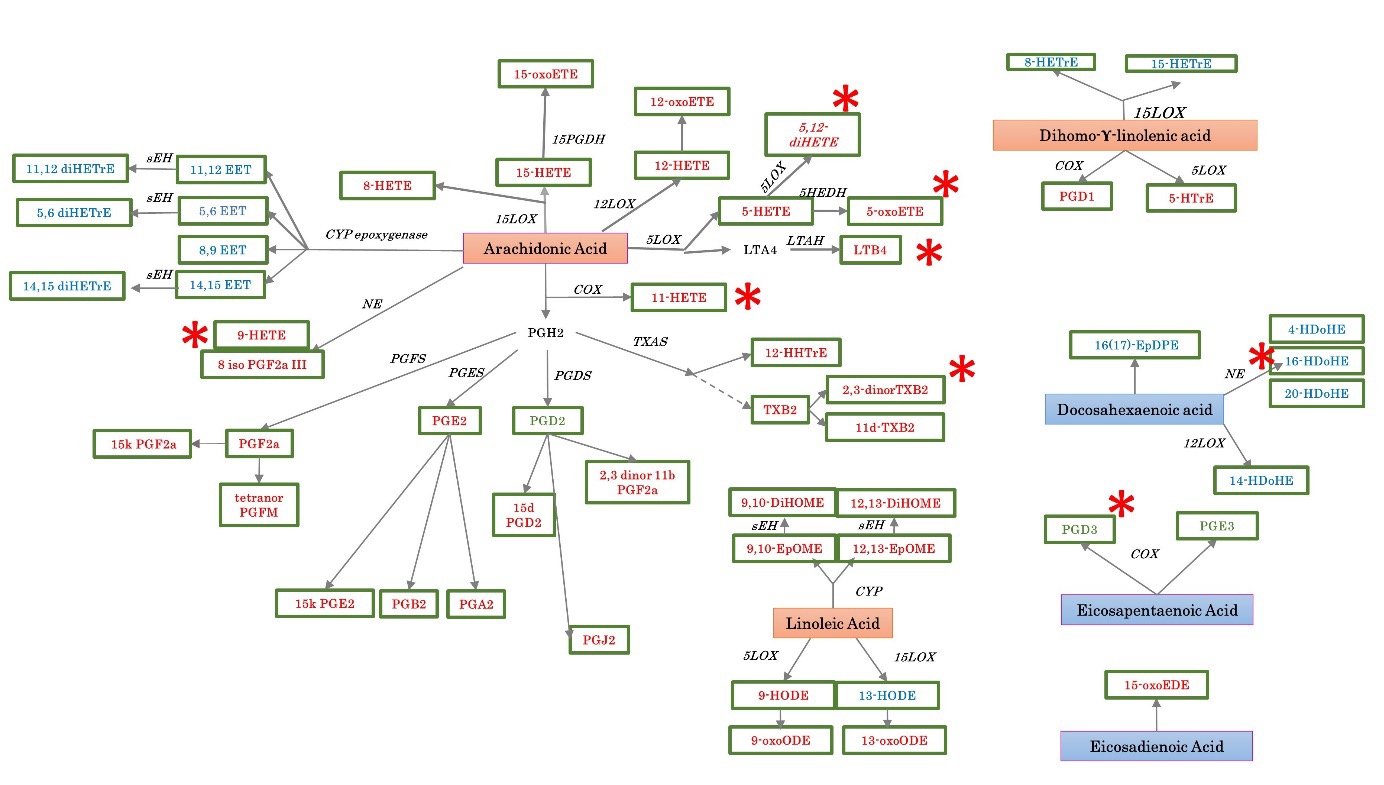Session Information
Date: Sunday, November 12, 2023
Title: (0380–0422) RA – Diagnosis, Manifestations, and Outcomes Poster I
Session Type: Poster Session A
Session Time: 9:00AM-11:00AM
Background/Purpose: Synovial membrane represents the target tissue of Rheumatoid Arthritis (RA) inflammation. Our study aimed to perform a comprehensive quantification of oxylipins and their precursors in synovial tissue specimens of RA patients across disease trajectory.
Methods: 32 patients fulfilling the ACR/EULAR 2010 classification criteria underwent US-guided minimally invasive synovial tissue biopsy of the knee [n=16 patients with DAS28≥4.2 and n=16 patients in sustained (≥12 months) clinical (DAS28≤2.6) and ultrasound remission (Power Doppler negative)]. Oxylipins in synovial tissue were determined by liquid chromatography with tandem mass spectrometry (LC-MS-MS) and were classified into groups according to their precursor: arachidonic acid (AA), LA, ALA, DHA, EPA and DGLA. Moreover, each sample was processed for histology and the synovitis degree was assessed using H&E-based scoring by pathologist blinded on clinical characteristics. Statistical analysis was performed using MetaboAnalyst 5.0 and SPSS software v27.
Results: Among the general panel, 84 different oxylipins were detected in at least one sample and 55 oxylipins remained after eliminating those with less than 50% across the samples (Figure 1). Stratifying RA patients based on the disease status, synovial tissue of active RA was significantly enriched of distinct specialized pro-resolving lipid mediators (SPMs) precursors such as free AA (p=0.0045), free adrenic acid (p=0.0080) and free docosahexaenoic acid (p=0.012) compared to synovial tissue of RA patients in sustained remission. Moreover, considering a threshold ≥4 of oxylipins expression, synovial tissue of active RA showed an 5LOX-derived oxylipins enrichment of 16.087 folds of 5,12-diHETE, 5.7419 folds of LTB4, TXA-derived 34.259 folds of 2,3 dinor TXB2, non-enzymatic -derived 6.192 folds of 16-HDoHE, 5.5097 folds of 9-HETE and, COX-derived oxylipins 4.8275 folds of 11-HETE compared to synovial tissue of RA patients in sustained clinical and ultrasound remission which was enriched 5.1589 folds of PGD3. Finally, the enrichment of pro-inflammatory SPMs was directly correlated with the histological synovitis degree (R2=0.473, p=0.006) particularly with the score of synovial hyperplasia (R2=0.472, p=0.006) and inflammatory infiltrate (R2=0.466, p=0.007).
Conclusion: Synovial tissue of RA patients shows a differential enrichment of oxylipins and their precursors which is contingent with the disease status directly mirroring the synovitis degree in terms of synovial hyperplasia and inflammatory infiltrate.
To cite this abstract in AMA style:
Perniola S, Murillo-Saich J, Tolusso B, Di Mario C, Gessi M, Bruno D, Petricca L, Gigante M, Gremese E, Guma M, Alivernini S. Differential Synovial Tissue Enrichment of Oxylipins and Their Mediators Across Rheumatoid Arthritis Trajectory [abstract]. Arthritis Rheumatol. 2023; 75 (suppl 9). https://acrabstracts.org/abstract/differential-synovial-tissue-enrichment-of-oxylipins-and-their-mediators-across-rheumatoid-arthritis-trajectory/. Accessed .« Back to ACR Convergence 2023
ACR Meeting Abstracts - https://acrabstracts.org/abstract/differential-synovial-tissue-enrichment-of-oxylipins-and-their-mediators-across-rheumatoid-arthritis-trajectory/

